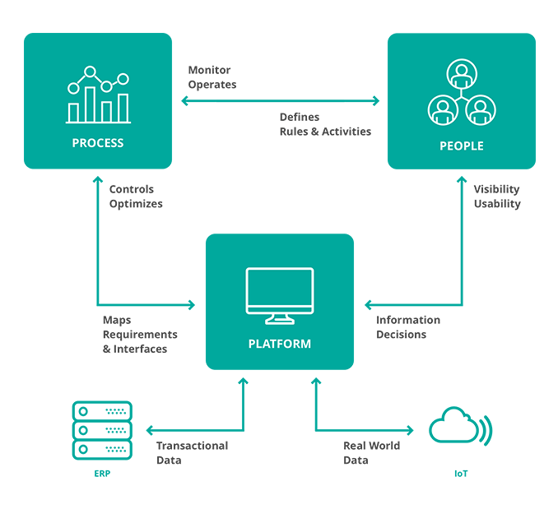Make no mistake, the odds are against you. Do more, spend less, change continuously, this is the non-stop, ever increasing thumping that deafens every other tactic guideline. A strong bottom line takes you so far. It’s how you keep your bottom line strong in spite of the uncertainties, competition and evolution that determines if your organization endures the tough test of sustainability.
Let’s face it, the landscape where our organizations work has changed, dramatically. Our customers want more, in less time, for less money, with greater quality and better diversity. Sure, blame it on the Internet, on the ability to compare prices, on the promises to deliver anything anywhere for almost nothing, but that’s how it is. And it’s getting tougher, with regulatory compliance, traceability and security concerns mounting as volumes reach new heights.
Using the standard corporate, old-style IT approach based on massive, module-oriented, static ERP platforms has created severe problems. Changing how the operations behave takes far too long, if at all possible. Because everything is compartmentalized on the ERP module structure, then you always know who's responsible, right? Wrong, today everything is linked across the organization and to make anything flow you need to engage with multiple corporate functions at the same time. If you're stuck with a module-driven IT approach, then you don't have accountability, you have the standard “It's a sales problem” or a “It's a quality problem” reply. Result: You just don't know what's happening and, worst, nobody does. As business changes, operations become more complex, demanding more effort, more system activities, which translates into more errors and more cost. And you're playing catch, because you know about the problem after it has occurred, instead of anticipating it and providing corrective measures to prevent it from happening.
If you're Uber, you're probably safe, you've got enough cash to solve the problem by making it disappear. If you're not, then you need a different approach.
And that approach is based on the fundamentals that drive your business today and that will make you unbeatable in the future: Process, People and Platform. These three fundamental pillars, which have been consistently overlooked in the urge to standardize and encapsulate everything on a common denominator, large scale, miraculous, long standing ERP solution, are the basis to achieve flexibility, efficiency and sustainability.
So, what are the key concepts behind each of these cornerstones?
-
Process is the fundamental management unit, that you need to monitor, control and operate. It's the lifeline of your organization and, if properly cured, what will make you anticipate problems and adjust to change. And we're not talking about the high level business processes like Procure To Pay or Order To Cash. We're talking about the fundamental operational processes that drive your mission. Each operational process is made of dozens of variations, that have different operational requirements, checkpoints, activities and business functions within. And for each of those processes and within each process for each running instance, you just need to know where along the chain it is, who is responsible for it, what is missing and if the deadline is going to be met or not. Each process spans multiple ERP modules, involves multiple corporate functions, requires massive amounts of information and has a lifecycle of its own. You need flexibility to change the way each process is mapped, how it is designed and how it is monitored, so you can take well-informed, sustainable decisions. By taking control of each of your operational processes and by monitoring it in real time you are in fact enabling your organization to achieve unbeatable efficiency and eagerly awaited sustainability.
-
People are the most valuable resource in the organization and their ability to perform on highly deregulated environments, given precise information and adequate tools, is unparalleled. But, if you load them with repetitive, error-prone, low value tasks, they quickly become a burden and a source for cost. So, you must focus on delivering simple, precise interfaces, fully engaged on the process at hand, cutting off all irrelevant and repetitive activities. Furthermore, given the increasing functional breadth of the operational processes in the organization, you increasingly need to implement cross functional teams and multi-functional elements that work together for a common process goal and where each team member accountability on each process instance is commonly visible and traceable. And this hardly matches the rigid, compartmentalized ERP vision, not to mention the ability to handle in one single operation multiple ERP activities without custom modifications on it.
-
Platform is the infrastructure that allows your Processes to be managed, operated and monitored by the People in real time, while supporting you in the need to change, in the need to audit and in the need to integrate with corporate solutions that provide the static behavior required for governance. This implicitly means an IT platform far distinct from the module-oriented, rigid and monolithic ERP solutions that dominate the market today. The underlying concepts of such platform must match the operational requirements and process awareness that will allow you to anticipate deviations in behavior and react dynamically as the world changes around you. This platform needs to be aware of the changes, processing events from all possible sources in real time and react dynamically to present the People on a given Process the precise information that makes the difference between failure and success. This means you have to abandon your ERP platform? No. But you have to stop making it do things it has not been design to do. And you have to bring in a solution that understands the static, module oriented vision of those ERP's and provides not only the seamless integration onto them but also the Process awareness and the People usability that make it more useful, more precise and far cheaper.

It is the combination of these 3 key drivers that forms an operational vision that makes you beat the odds. Why?
-
Because you have a precise vision of the operational processes that support your mission, understanding at any given moment how they are behaving;
-
Because you have a complete operational mapping of your organization, anticipating bottlenecks and deviations by changing the processes in the precise activities that allow you to increase efficiency, meet business challenges or withstand new regulatory compliance demands;
-
Because you make your People deliver more by doing relevant activities with relevant data on the exact timing that makes the difference;
-
Because you are able to change when you need to change while keeping your ERP standard;
-
Because you can run your processes the way they make sense to your organization;
Over the years, at Processware we have successfully applied this vision on many different business and operation landscapes, on widely different industries, achieving remarkable results. Our customers are able to achieve benchmark ROIs, reduce TCO on the ERP platform by more than 60% and achieve cost reductions that go as high as 80%, while changing processes as fast as the demand changes.
We believe so strongly on this vision that we have built our internal culture around this sustainability supporting principle. You can check here how we have made it work for us.
